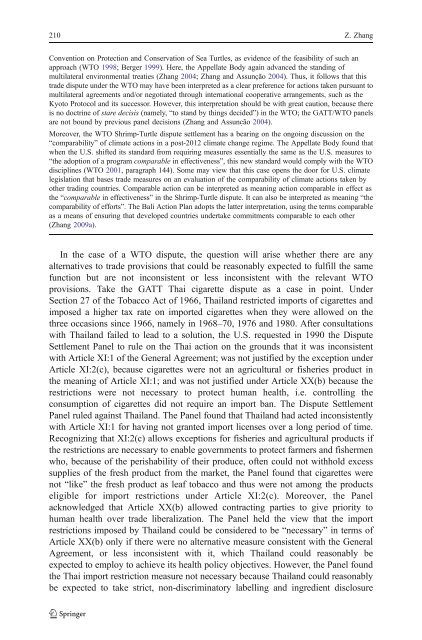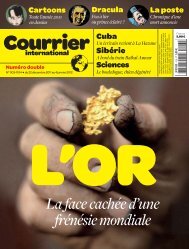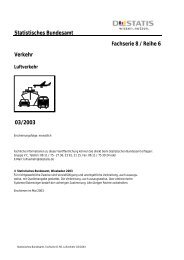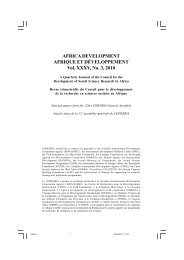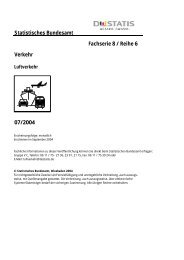The international economics of resources and resource ... - Index of
The international economics of resources and resource ... - Index of
The international economics of resources and resource ... - Index of
You also want an ePaper? Increase the reach of your titles
YUMPU automatically turns print PDFs into web optimized ePapers that Google loves.
210 Z. Zhang<br />
Convention on Protection <strong>and</strong> Conservation <strong>of</strong> Sea Turtles, as evidence <strong>of</strong> the feasibility <strong>of</strong> such an<br />
approach (WTO 1998; Berger 1999). Here, the Appellate Body again advanced the st<strong>and</strong>ing <strong>of</strong><br />
multilateral environmental treaties (Zhang 2004; Zhang <strong>and</strong> Assunção 2004). Thus, it follows that this<br />
trade dispute under the WTO may have been interpreted as a clear preference for actions taken pursuant to<br />
multilateral agreements <strong>and</strong>/or negotiated through <strong>international</strong> cooperative arrangements, such as the<br />
Kyoto Protocol <strong>and</strong> its successor. However, this interpretation should be with great caution, because there<br />
is no doctrine <strong>of</strong> stare decisis (namely, “to st<strong>and</strong> by things decided”) in the WTO; the GATT/WTO panels<br />
are not bound by previous panel decisions (Zhang <strong>and</strong> Assunção 2004).<br />
Moreover, the WTO Shrimp-Turtle dispute settlement has a bearing on the ongoing discussion on the<br />
“comparability” <strong>of</strong> climate actions in a post-2012 climate change regime. <strong>The</strong> Appellate Body found that<br />
when the U.S. shifted its st<strong>and</strong>ard from requiring measures essentially the same as the U.S. measures to<br />
“the adoption <strong>of</strong> a program comparable in effectiveness”, this new st<strong>and</strong>ard would comply with the WTO<br />
disciplines (WTO 2001, paragraph 144). Some may view that this case opens the door for U.S. climate<br />
legislation that bases trade measures on an evaluation <strong>of</strong> the comparability <strong>of</strong> climate actions taken by<br />
other trading countries. Comparable action can be interpreted as meaning action comparable in effect as<br />
the “comparable in effectiveness” in the Shrimp-Turtle dispute. It can also be interpreted as meaning “the<br />
comparability <strong>of</strong> efforts”. <strong>The</strong> Bali Action Plan adopts the latter interpretation, using the terms comparable<br />
as a means <strong>of</strong> ensuring that developed countries undertake commitments comparable to each other<br />
(Zhang 2009a).<br />
In the case <strong>of</strong> a WTO dispute, the question will arise whether there are any<br />
alternatives to trade provisions that could be reasonably expected to fulfill the same<br />
function but are not inconsistent or less inconsistent with the relevant WTO<br />
provisions. Take the GATT Thai cigarette dispute as a case in point. Under<br />
Section 27 <strong>of</strong> the Tobacco Act <strong>of</strong> 1966, Thail<strong>and</strong> restricted imports <strong>of</strong> cigarettes <strong>and</strong><br />
imposed a higher tax rate on imported cigarettes when they were allowed on the<br />
three occasions since 1966, namely in 1968–70, 1976 <strong>and</strong> 1980. After consultations<br />
with Thail<strong>and</strong> failed to lead to a solution, the U.S. requested in 1990 the Dispute<br />
Settlement Panel to rule on the Thai action on the grounds that it was inconsistent<br />
with Article XI:1 <strong>of</strong> the General Agreement; was not justified by the exception under<br />
Article XI:2(c), because cigarettes were not an agricultural or fisheries product in<br />
the meaning <strong>of</strong> Article XI:1; <strong>and</strong> was not justified under Article XX(b) because the<br />
restrictions were not necessary to protect human health, i.e. controlling the<br />
consumption <strong>of</strong> cigarettes did not require an import ban. <strong>The</strong> Dispute Settlement<br />
Panel ruled against Thail<strong>and</strong>. <strong>The</strong> Panel found that Thail<strong>and</strong> had acted inconsistently<br />
with Article XI:1 for having not granted import licenses over a long period <strong>of</strong> time.<br />
Recognizing that XI:2(c) allows exceptions for fisheries <strong>and</strong> agricultural products if<br />
the restrictions are necessary to enable governments to protect farmers <strong>and</strong> fishermen<br />
who, because <strong>of</strong> the perishability <strong>of</strong> their produce, <strong>of</strong>ten could not withhold excess<br />
supplies <strong>of</strong> the fresh product from the market, the Panel found that cigarettes were<br />
not “like” the fresh product as leaf tobacco <strong>and</strong> thus were not among the products<br />
eligible for import restrictions under Article XI:2(c). Moreover, the Panel<br />
acknowledged that Article XX(b) allowed contracting parties to give priority to<br />
human health over trade liberalization. <strong>The</strong> Panel held the view that the import<br />
restrictions imposed by Thail<strong>and</strong> could be considered to be “necessary” in terms <strong>of</strong><br />
Article XX(b) only if there were no alternative measure consistent with the General<br />
Agreement, or less inconsistent with it, which Thail<strong>and</strong> could reasonably be<br />
expected to employ to achieve its health policy objectives. However, the Panel found<br />
the Thai import restriction measure not necessary because Thail<strong>and</strong> could reasonably<br />
be expected to take strict, non-discriminatory labelling <strong>and</strong> ingredient disclosure


